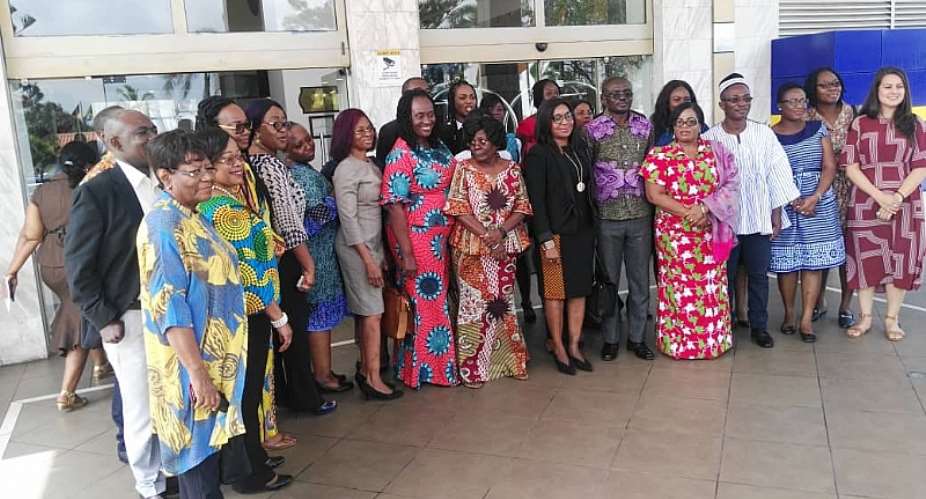The Promotion of Gender Equality and women’s empowerment has been recognized as a catalyst for the achievement of the Sustainable Development of communities, countries and the world at large.
Women, especially in Africa are still very much at the periphery of political, economic and social decisions and relies most often on decisions made by others regarding their lives.
In Ghana, women constitute 51.2% of the population; this implies that without the full participation of more than half of the citizens in the public discourse or decision-making process, it would be difficult for Ghana to achieve sustainable development.
It is against this background that the UNDP in partnership with the Ministry of Gender, Children and Social Protection and the Canadian High Commission and other stakeholders on Thursday held a one-day workshop on the Affirmative Action Bill Advocacy (AAB) and Communication Strategy Planning.
Affirmative Action are measures taken by governments or other stakeholders to increase opportunities for an underrepresented group of society.
Some countries on the African continent have been successful in using affirmative action policies or laws in increasing women’s participation and representation in public life.
The workshop brought together about 50 participants from the government, CSOs as well as development partners to help develop an advocacy and communication strategy to facilitate the adoption of the AAB to promote women's participation in decision making at all levels.
The workshop was aimed at soliciting inputs from stakeholders into the draft AAB Advocacy and Communication Strategy.
The workshop was also meant among other things to galvanise the commitment of stakeholders towards advocating for the passage of the AAB by Parliament.
Addressing the workshop, the UNDP Acting Resident Representative, Rokya Ye Dieng, said Ghana is not only signatory to key international and regional instruments including the Sustainable Development Goals in promoting these efforts but have also put in place institutional structures, developed and adopted national laws, policies and frameworks to promote gender equality.
“Despite these efforts, women’s representation and participation at all levels of decision making in Ghana continue to be low,” she bemoaned, adding that “For example, there are only 38 women currently in the 275-member Parliament of Ghana, representing 13.8% ranking Ghana the 141st in the world.
She further mentioned that though it is a slight improvement compared to the previous parliament which had only 10.7%. Additionally, numbers of women elected to District Assemblies continue to decline over the years with 10% in 2006, to 6% in 2010 and 5.4% in 2015.
She urged the stakeholders to continue to contribute towards the advancement of this cause to facilitate change for a better and prosperous Ghana for all.
In an interview with newsmen, Jennifer Asuako, Gender Analyst at UNDP, observed that AAB stakeholders and developing partners will continue to engage parliament since the whole concept is a process.
"We believe that as we continue to follow the due processes and engage parliament, we would soon make headway by ensuring that the Parliament of Ghana passes the AAB. We are not in any way worried about the setbacks and delays so we will keep pushing," Jennifer Asuako stated.





 Minority will expose the beneficial owners of SML, recover funds paid to company...
Minority will expose the beneficial owners of SML, recover funds paid to company...
 Prof. Opoku-Agyemang has ‘decapitated’ the NPP’s strategies; don’t take them ser...
Prof. Opoku-Agyemang has ‘decapitated’ the NPP’s strategies; don’t take them ser...
 Abubakar Tahiru: Ghanaian environmental activist sets world record by hugging 1,...
Abubakar Tahiru: Ghanaian environmental activist sets world record by hugging 1,...
 Prof. Naana Opoku-Agyemang will serve you with dignity, courage, and integrity a...
Prof. Naana Opoku-Agyemang will serve you with dignity, courage, and integrity a...
 Rectify salary anomalies to reduce tension and possible strike action in public ...
Rectify salary anomalies to reduce tension and possible strike action in public ...
 Stop all projects and fix ‘dumsor’ — Professor Charles Marfo to Akufo-Addo
Stop all projects and fix ‘dumsor’ — Professor Charles Marfo to Akufo-Addo
 Blue and white painted schools will attract dirt shortly – Kofi Asare
Blue and white painted schools will attract dirt shortly – Kofi Asare
 I endorse cost-sharing for free SHS, we should prioritise to know who can pay - ...
I endorse cost-sharing for free SHS, we should prioritise to know who can pay - ...
 See the four arsonists who petrol-bombed Labone-based CMG
See the four arsonists who petrol-bombed Labone-based CMG
 Mahama coming back because Akufo-Addo has failed, he hasn't performed more than ...
Mahama coming back because Akufo-Addo has failed, he hasn't performed more than ...
